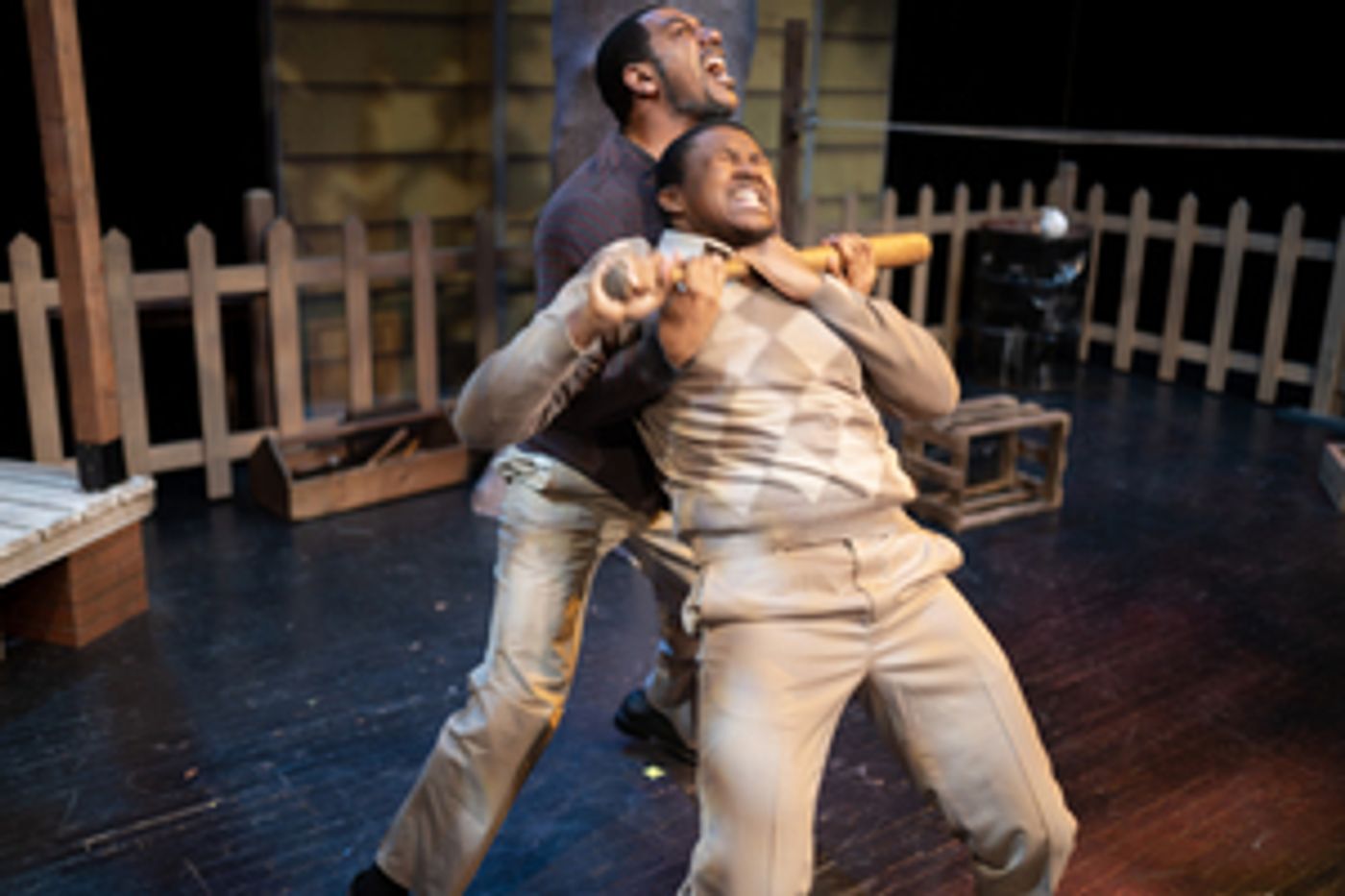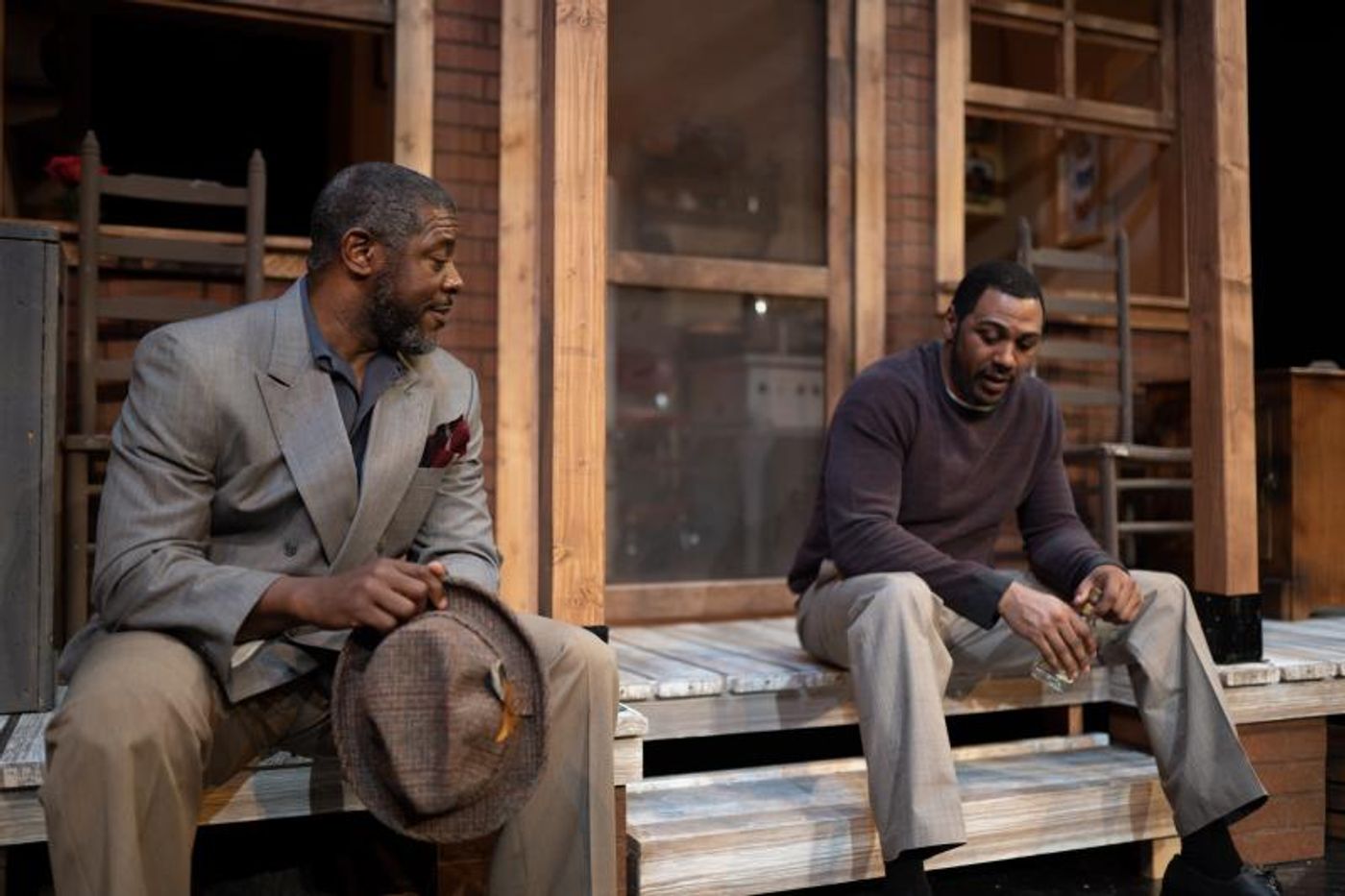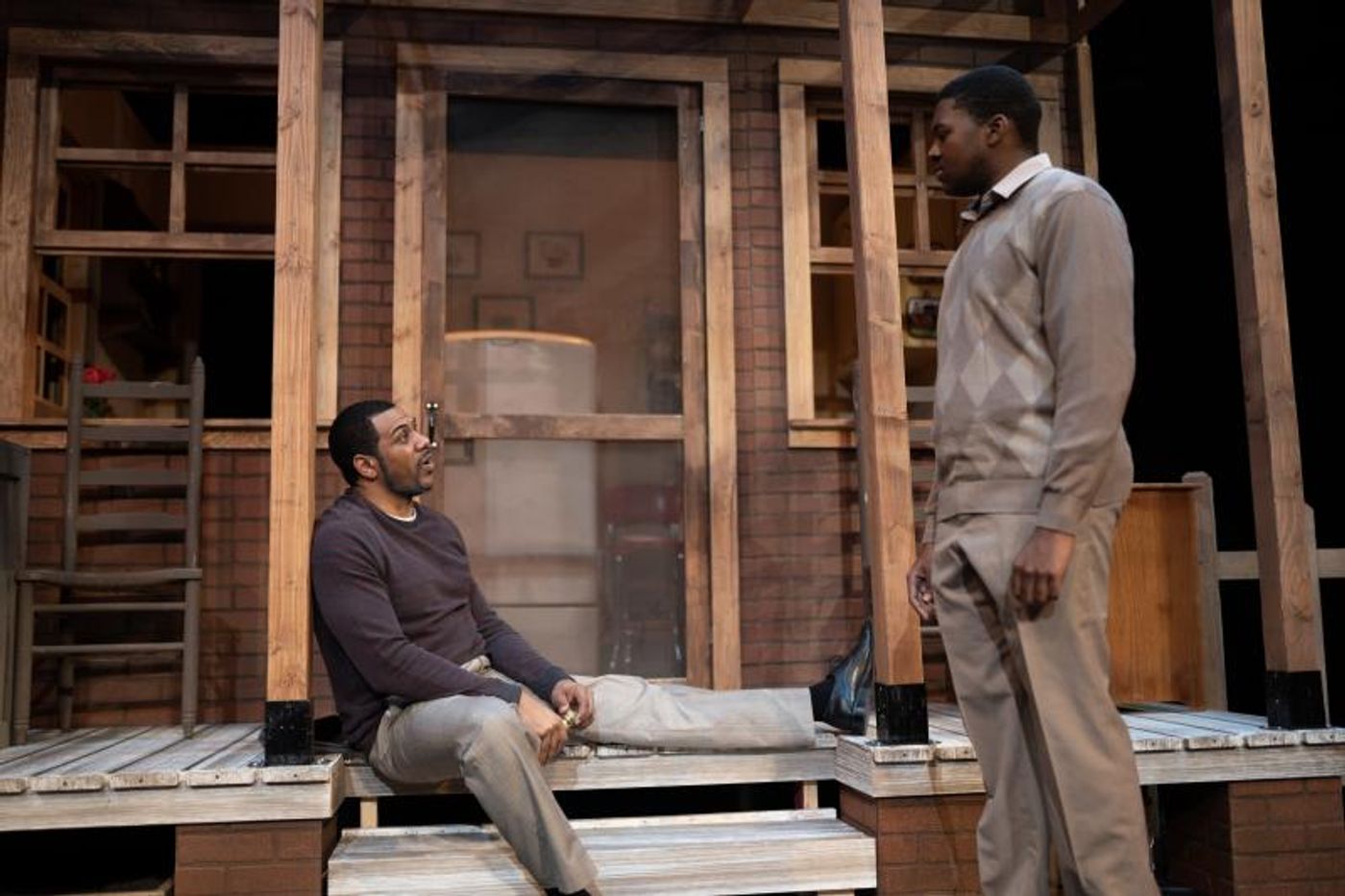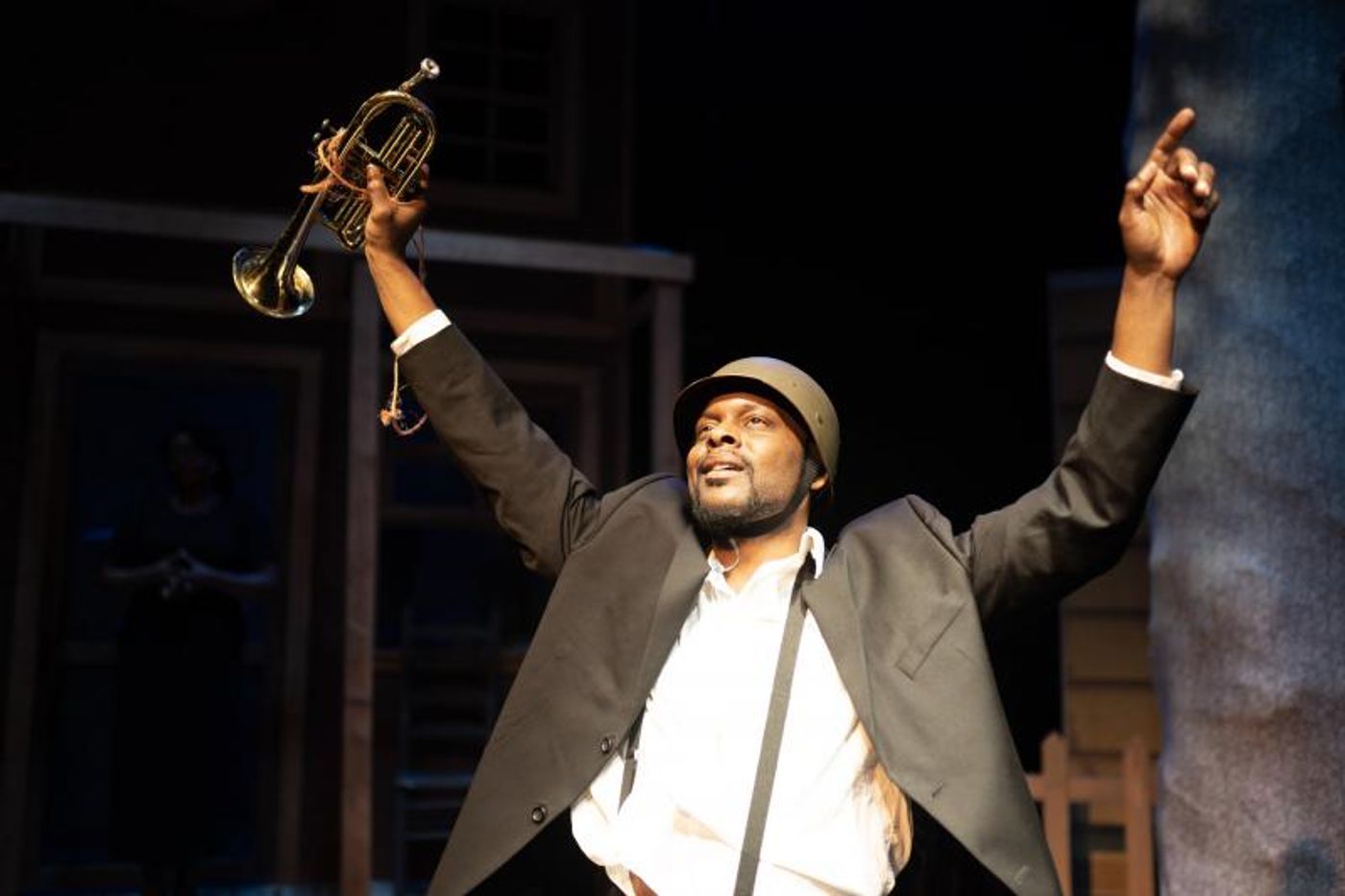Review: Sports Seasons and Generations Clash in Brand New Sheriff's FENCES

Sports fans quickly get a feel for what time of year it is in August Wilson's FENCES, set in 1957 Pittsburgh. Baseball seems to be supreme as you walk in to Brand New Sheriff's production at Spirit Square. James Duke's impressive set design doles out the left side of the Duke Energy Theater stage to a ramshackle two-story house. But a shabby yard dominates the right side, where a baseball dangles on a rope from an old gray tree. Pick up a bat, this is Troy Maxson's place.
Maxson, an ex-baseball great, talks about the icons of the game, past and present, mostly contemptuous toward the white men who dominate the scene, while his friend Jim Bono rates Troy only below Babe Ruth and Josh Gibson as the best who have ever played. Since Gibson played in the Negro Leagues for the Homestead Grays, based in a mill town adjacent to Pittsburgh, it's likely that he's seen Josh far more often on the field than the Babe - especially since he introduced Troy to the sport during a prison stretch.
By the time Jackie Robinson had broken Major League Baseball's color line in 1947, Troy was already 43, just missing the boat to national fame and power-hitting glory. Instead, he's a garbage collector when we first see him on a Friday Night, as he and Jim observe their weekly ritual of getting drunk in Troy's yard. We'll hear mentions of Pittsburgh Pirates players, Dick Scofield and the under-utilized Roberto Clemente, who seems promising to Troy's keen eye, so baseball is always in the air.

We begin to zero in on the time of year it is when Troy's son Cory first appears, trying to get dad's permission for a visit from a college scout wanting to offer the kid a football scholarship. Troy doesn't want Cory to give up his job to start his final season with his high school team, and in subsequent scenes, we'll see his football jersey and shoulder pads, further assuring us that we've reached that point in the year when baseball and football seasons overlap. We hear about the Milwaukee Braves leading the National League pennant race, their wicked pitching duo of Warren Spahn and Lew Burdette, and their young slugger, Henry Aaron.
Hank, we hear, has hit 43 homers in a year he finished with 44, so it must be late September. Within a few weeks, the Brooklyn Dodgers and the New York Giants will play their last home games in New York City before moving out to California, and Aaron - destined to surpass the Babe on the all-time home run list - will lead the Braves to victory over the Yankees in the World Series.
As Troy's pal Bono and his wife Rose keep telling him, times are changing. A Goliath among ballplayers, accustomed to idol worship, Troy doesn't easily change his thinking, so it's interesting to watch how Bono and Rose make headway on those rare occasions when they do. Cory really doesn't stand a chance against Troy's tyrannical whims unless Rose intercedes on his behalf. Maybe he should have chosen baseball over football?
The father-son relationship is complicated by jealousy and resentment on both sides. Troy is ambivalent about seeing his son succeed in a way that he couldn't, and Cory is wary of comparisons with his legendary dad, perhaps seeking to sidestep his shadow by turning to a different sport.

Wilson doesn't downplay the Troy legend. On the contrary, he delightfully magnifies his mythic dimensions. Troy tells us how he has stared down the Devil, tells us how he wrestled with Death for three days, and he shouts his defiance toward the Grim Reaper before our eyes. So Troy's practical advice toward his son clashes with his own swollen self-regard - and with his disregard for social norms. On the job, his strength and pugnacity will enable him to become the first black garbage truck driver in town, but at home, his unchecked infidelity will cost him.
Part baseball legend, part Greek epic hero, and - as Bono observes - part "Uncle Remus," Troy is the powerhouse that makes FENCES among the most produced and anthologized of Wilson's plays. Of the four productions I've seen in Charlotte, beginning in 1991 when Charlotte Repertory Theatre presented the local premiere, Brand New Sheriff's best demonstrates how a strong overall cast elevates the script to the stratosphere of a classic.
And we're seeing the best Troy we've had here in Jonavan Adams, who combines Ed Bernard's physical presence from the Rep production of 1991 with the corrosive meanness and fiery defiance of Wayne DeHart at Theatre Charlotte in 1996. Snarling, cajoling, roaring, and willing us to see his distorted vision of the world, Adams is more outsized and supernatural than we've seen him before.
It likely helps that he and director Corlis Hayes are on their second go-round with FENCES. The 2013 version at CPCC, where Adams played Lyons, Troy's jazzy musician son, wasn't the best of the previous versions, to be honest. But the current BNS production sure does demonstrate the benefits of taking a second shot at a work you revere. Cumulative experience with the playwright helps, too, for Adams builds upon what he learned in other parts of Wilson's century-spanning Pittsburgh Cycle, with roles in The Piano Lesson, Two Trains Running, Ma Rainey's Black Bottom, and Joe Turner's Come and Gone.
With BNS committed to presenting all of Wilson's Cycle, others who have appeared with the company and in plays by this playwright are also shining lights here, most conspicuously Tim Bradley as Bono and LeShea Nicole as Rose. Audience members who hopped aboard the Pittsburgh train in 2017 with Jitney are certainly enjoying the ride the most. Bradley has been onstage at Duke Energy at every stop so far, and his Bono is a worthy - and compatible - longtime companion for Troy, not quite as righteous and upstanding as Memphis from Two Trains but strong and honorable when Troy could use a reality check.

Nicole was paired with Adams last year in Two Trains, so their rich and nuanced chemistry as Rose and Troy shouldn't be a surprise. Rose is a stronger woman here, so when she holds out her hand on Friday nights, she isn't merely asking for Troy's pay envelope. Rose is Troy's equal, and then some - the family nucleus. Everybody but Troy seems to get that until her climactic utterances deep in Act 2.
Still a junior at UNC Charlotte, Dylan Ireland is no stranger to BNS, having starred as Huey in Rory Sheriff's Boys to Baghdad. As Cory, Ireland stands up to his dad without strapping on his shoulder pads. Eventually, he even disrespects Troy when he's drunk and blocking the front door.
It's a complex role for Ireland, who must forcefully declare that he doesn't fear his father while imperfectly hiding that he does. He's the reluctant, resentful free labor that Troy enlists to help build a fence around his property. So Ireland's confrontations with Adams - along with Troy's run-ins with Death - will come to mind when you contemplate the meaning of Wilson's title.
Graham Williams, lately the Tin Man in BNS's Be A Lion, has the cool-cat swagger you expect to see from Lyons. Though he does scrupulously pay Dad back on his loans, Lyons does not prosper as a musician, and Williams gives us a poignant picture of his decline. Seven-year-old Raynell appears late in the show, a bit of a consolation for the misfortunes that befall the other Maxsons, and Lauren Vinson plays her sweetly, only slightly difficult to manage.

Seven years younger than his brother Troy, Gabriel is a World War 2 vet who came back from the battlefield delusional, with a metal plate in his head. Troy may have seen Death and the Devil, but Gabriel believes that he has seen St. Peter and that he is the archangel Gabriel, destined the blow his junky trumpet on Judgment Day. James Lee Walker II plays this extravagant simpleton, the only cast member from the 2013 CPCC production to return in the same role.
More than ever, I must lament that I missed Walker when I reviewed the Sunday matinee of the 2013 production, when he was replaced by an understudy. Walker's crazed, sunshiney energy this time around is a constant joy, and the ending, botched by the understudy or Hayes' stage direction back then, was absolute perfection when I saw it on Saturday night. The glow of that ending may convince many that FENCES is Wilson's finest drama, and there's plenty of firepower from the rest of the cast to fuel that feeling.
Reader Reviews
Videos

